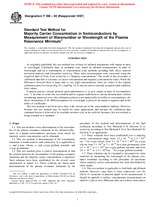We need your consent to use the individual data so that you can see information about your interests, among other things. Click "OK" to give your consent.
ASTM F398-92(1997)
Standard Test Method for Majority Carrier Concentration in Semiconductors by Measurement of Wavenumber or Wavelength of the Plasma Resonance Minimum
STANDARD published on 10.6.1997
The information about the standard:
Designation standards: ASTM F398-92(1997)
Note: WITHDRAWN
Publication date standards: 10.6.1997
SKU: NS-55149
The number of pages: 10
Approximate weight : 30 g (0.07 lbs)
Country: American technical standard
Category: Technical standards ASTM
Annotation of standard text ASTM F398-92(1997) :
Keywords:
Carrier concentration, Electrical conductors-semiconductors, Gallium arsenide, Germanium-semiconductor applications, Impurities-semiconductors, Infrared (IR) analysis-semiconductors, Minority carriers, Plasma resonance (wavelength), Reflectance and reflectivity-electronic materials/applications, Resonance wavelength, Silicon-semiconductor applications, Spectrophotometry-infrared (of semiconductors), Wavelength, majority carrier concentration in doped semiconductors, by measuring
Additional information
| 1. Scope |
|
1.1 This test method covers determination of the wavenumber of the plasma resonance minimum in the infrared reflectance of a doped semiconductor specimen, from which the majority carrier concentration can be obtained. 1.2 This test method of determination of the wavenumber minimum is nondestructive and contactless. It is applicable to n- and p-type silicon, n- and p-type gallium arsenide, and n-type germanium. 1.3 This test method gives a relative measurement in that the relation between the wavenumber of the plasma resonance minimum and the majority carrier concentration is empirical. Such relations have been established for the several cases summarized in Annex A1. These relations are based upon determinations of the plasma resonance minimum by the procedure of this method and determinations of the Hall coefficient according to Test Methods F76 (Section 2) or resistivity according to Test Methods F43 or Test Method F84 (Section 2) as appropriate. 1.4 These relations have been established over a majority carrier concentration range from 1.5 X 10 to 1.5 X 10 cm for n-type silicon, from 3 X 10 to 5 X 10 for p-type silicon, from 3 X 10 to 7 X 10 for n-type germanium, from 1.5 X 10 to 1 X 10 for n-type gallium arsenide, and from 2.6 X 10 to 1.3 X 10 cm for p-type gallium arsenide. 1.5 These relations can be extended or developed for other materials by measuring the wavelength of the plasma resonance minimum according to this procedure on specimens whose majority carrier concentration has been determined by other means. 1.6 This test method is applicable to both bulk and diffused material. However, since there is some controversy over the effects of variations of junction depth on the measurement, it should be applied to surface concentration measurements on shallow (1 [mu]m or less) diffusions only on a relative basis unless there is experimental corroboration of the results under the conditions of interest. 1.7 This standard does not purport to address all of the safety problems, if any, associated with its use. It is the responsibility of the user of this standard to establish appropriate safety and health practices and determine the applicability of regulatory limitations prior to use. |
We recommend:
Technical standards updating
Do you want to make sure you use only the valid technical standards?
We can offer you a solution which will provide you a monthly overview concerning the updating of standards which you use.
Would you like to know more? Look at this page.




 Cookies
Cookies
